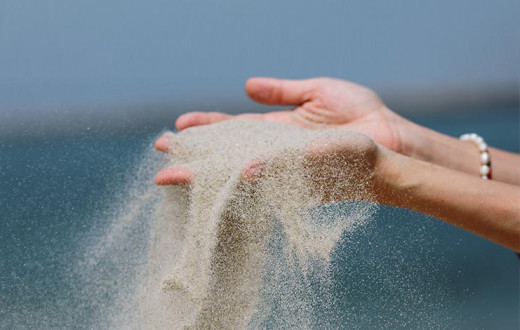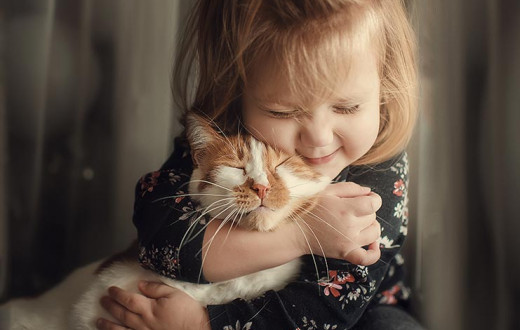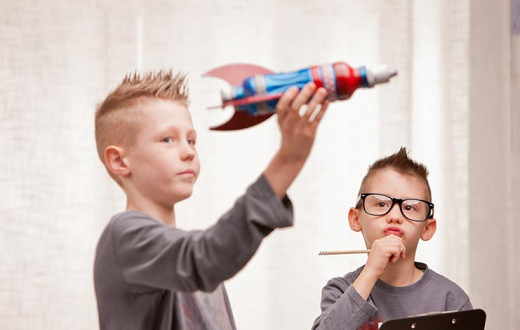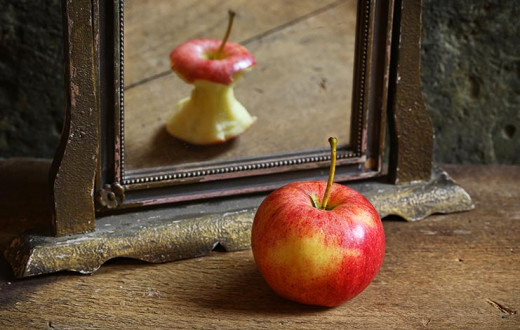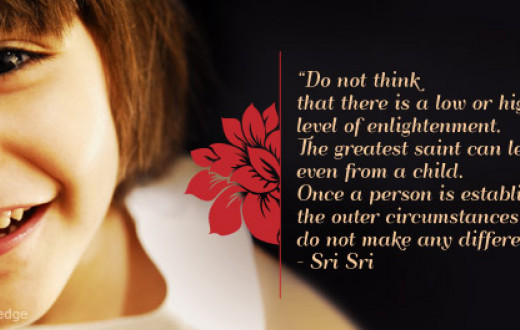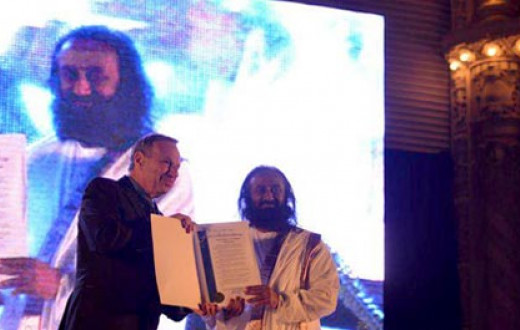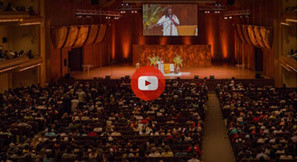17 Apr 2009 Turkey
‘Silence is the mother of all virtues’
Bangalore, India, April 17 (Friday), 8:10 pm: Dance, laughter and high energy! The Vishalakshi Mantap at the Art of Living Centre was pulsating with the sounds of the guitar, dholak (a percussion instrument), a drum and tambourines.
The crowd erupted in cheers when Gurudev opened his eyes after meditation and asked: ‘How are you all?’ (Gurudev often asks this question in satsangs around the world.)
Excerpts from the Q&A session that followed:
I repeatedly get stuck in the same behavioural patterns. How do I get rid of my behaviour?
Sri Sri Ravi Shankar:
Why do you do the same mistakes again and again? We think it is giving us some joy, some pleasure. We should not eternalize or generalise problems.
Some people keep saying: ‘I’m always in problems’. If you are always in a problem, then how will you know when you’re in one! Knowledge always comes when you experience a contrast.
People say: ‘Everyone is sick in town.’ Perhaps, it could be only 40-50 percent of the population and not everyone.
Generalising and eternalising problems like ‘Everybody is bad’ will not allow you to rise above challenges. It will pull you down. Just by being aware about the problem, it will drop off.
If someone keeps saying: ‘I have to do this, ‘I have to do this,’ then you feel tired just thinking about it.
Just relax. Silence is the mother of all virtues. Let go. Silence is the mother of all qualities, all abilities.
Some people keep saying: ‘I’m always in problems’. If you are always in a problem, then how will you know when you’re in one! Knowledge always comes when you experience a contrast.
People say: ‘Everyone is sick in town.’ Perhaps, it could be only 40-50 percent of the population and not everyone.
Generalising and eternalising problems like ‘Everybody is bad’ will not allow you to rise above challenges. It will pull you down. Just by being aware about the problem, it will drop off.
If someone keeps saying: ‘I have to do this, ‘I have to do this,’ then you feel tired just thinking about it.
Just relax. Silence is the mother of all virtues. Let go. Silence is the mother of all qualities, all abilities.
Are the thoughts in the mind created within or come from outside?
Sri Sri Ravi Shankar:
You get more thoughts than me. Then you’re an expert at generating thoughts. You should know. Sit and find out.
They say God is omnipresent and they have vahanas (vehicles). Like Nandi (the sacred cow) for Shiva and the mouse for Ganesha. What is the significance of these?
Sri Sri Ravi Shankar:
The Divine energy is carried through different symbols. The Parmatma is One.
Yet different aspects of that Divinity are carried through different symbols.
It is so interesting. Our ancient people had the concept of opposites. The mouse is so small and the elephant is so big. Yet, the knowledge of an elephant (Ganesha) is riding on a small mouse (his vahana).
Kabir (a renowned Indian saint) did not study in a university. He had his Guru mantra. With one little mantra, he went into Samadhi (the deepest meditative state) and his consciousness blossomed.
The Divine Mother comes on a tiger. The Divine Mother is the most delicate feminine form of Divinity and She comes on one of the most ferocious of animals.
The commander-in-chief of the armies of the Gods, Karthikeyan, comes on a peacock. The peacock is associated with art and music.
There is a deeper significance to these symbols.
Goddess Saraswati (Goddess of Knowledge) is sitting on a rock. The rock does not move anywhere. Goddess of Wealth (Goddess Lakshmi) sits on a lotus flower in water. Wealth is unstable. You don’t know when the share market is going to be unstable – how money can come and go.
The very fact that most Gods and Goddesses are sitting on a lotus flower depicts a fully blossomed consciousness. Only when the consciousness is fully blossomed, does Divinity ride on it.
Like the lotus flower whose petals transform from being concave to convex. Perhaps in those days, there weren’t any chrysanthemums. Otherwise, they would have put some Gods and Goddesses on chrysanthemums.
Your real wealth is your inner strength. Your inner sense of fullness and not your bank balance is your real wealth.
You may have lots of money in the bank, but if your mind is fearful and small, then what is the point?
Today a gentleman came from Mandya (a small town in Karnataka) to meet me. He has two houses and doesn’t have a job. He wants to sell one house and use the money to start a business. He wants to donate the other plot for a meditation centre.
He insisted that I take the land. The land costs several millions of dollars. He had even come with the land papers. I took the papers and told him: ‘This is mine, but it will be with you. You take care of it. You keep it. You start your business, make your life stable, make your finances better. I’m not going to accept it.’
What I’m saying is that those who have very little have big hearts to give. I appreciate it. This is the most precious offer. That man came with his wife and mother. They kept saying, ‘Guruji, please make a Temple of Knowledge over here. We have benefitted so much from the courses, we want others to enjoy.’
Just the gesture is enough. The heart that wants to do gets blessings.
Isn’t it so interesting? Values of humanness and generosity are still alive on this planet.
People with big hearts are still alive.
I remember on the last day of the Silver Jubilee (The Art of Living celebrated 25 years of service in 2006), I met all the volunteers. As I was leaving, a 25-year-old boy came up to me, gave me an envelope and began to cry. He grabbed my feet and hands and sobbingly said: ‘Thank you, please accept this.’
I took it and asked him what he did for a living. He was a labourer from Kerala (an Indian state) and had come to do seva for 15 days. ‘Guruji, I don’t know how to express my gratitude. My life has changed. Please accept this.’ (Pointing to the envelope.)
I opened it and saw that it had Rs 5,000. It must have been his salary of two months.
I asked him about his family responsibilities. He has a mother, sister and is the eldest of two sons. I took Rs 100 from the amount and told him: ‘This money is worth millions to me. Take the rest of the amount home.’
All that we need is to have a heart to do something. Nature will help you.
God will help you.
Yet different aspects of that Divinity are carried through different symbols.
It is so interesting. Our ancient people had the concept of opposites. The mouse is so small and the elephant is so big. Yet, the knowledge of an elephant (Ganesha) is riding on a small mouse (his vahana).
Kabir (a renowned Indian saint) did not study in a university. He had his Guru mantra. With one little mantra, he went into Samadhi (the deepest meditative state) and his consciousness blossomed.
The Divine Mother comes on a tiger. The Divine Mother is the most delicate feminine form of Divinity and She comes on one of the most ferocious of animals.
The commander-in-chief of the armies of the Gods, Karthikeyan, comes on a peacock. The peacock is associated with art and music.
There is a deeper significance to these symbols.
Goddess Saraswati (Goddess of Knowledge) is sitting on a rock. The rock does not move anywhere. Goddess of Wealth (Goddess Lakshmi) sits on a lotus flower in water. Wealth is unstable. You don’t know when the share market is going to be unstable – how money can come and go.
The very fact that most Gods and Goddesses are sitting on a lotus flower depicts a fully blossomed consciousness. Only when the consciousness is fully blossomed, does Divinity ride on it.
Like the lotus flower whose petals transform from being concave to convex. Perhaps in those days, there weren’t any chrysanthemums. Otherwise, they would have put some Gods and Goddesses on chrysanthemums.
Your real wealth is your inner strength. Your inner sense of fullness and not your bank balance is your real wealth.
You may have lots of money in the bank, but if your mind is fearful and small, then what is the point?
Today a gentleman came from Mandya (a small town in Karnataka) to meet me. He has two houses and doesn’t have a job. He wants to sell one house and use the money to start a business. He wants to donate the other plot for a meditation centre.
He insisted that I take the land. The land costs several millions of dollars. He had even come with the land papers. I took the papers and told him: ‘This is mine, but it will be with you. You take care of it. You keep it. You start your business, make your life stable, make your finances better. I’m not going to accept it.’
What I’m saying is that those who have very little have big hearts to give. I appreciate it. This is the most precious offer. That man came with his wife and mother. They kept saying, ‘Guruji, please make a Temple of Knowledge over here. We have benefitted so much from the courses, we want others to enjoy.’
Just the gesture is enough. The heart that wants to do gets blessings.
Isn’t it so interesting? Values of humanness and generosity are still alive on this planet.
People with big hearts are still alive.
I remember on the last day of the Silver Jubilee (The Art of Living celebrated 25 years of service in 2006), I met all the volunteers. As I was leaving, a 25-year-old boy came up to me, gave me an envelope and began to cry. He grabbed my feet and hands and sobbingly said: ‘Thank you, please accept this.’
I took it and asked him what he did for a living. He was a labourer from Kerala (an Indian state) and had come to do seva for 15 days. ‘Guruji, I don’t know how to express my gratitude. My life has changed. Please accept this.’ (Pointing to the envelope.)
I opened it and saw that it had Rs 5,000. It must have been his salary of two months.
I asked him about his family responsibilities. He has a mother, sister and is the eldest of two sons. I took Rs 100 from the amount and told him: ‘This money is worth millions to me. Take the rest of the amount home.’
All that we need is to have a heart to do something. Nature will help you.
God will help you.
How important is money in pursuing goals, career and achievements? If we don’t have enough, will we achieve our goals?
Sri Sri Ravi Shankar:
If you go with a ‘lack consciousness’, then any amount of money won’t be enough for you. You will have thoughts like: ‘What will happen in my old age? What is going to happen?’
One day, however much you feed your body, it is going to go.
Money is a means. Earn money, don’t spend foolishly. People are ready to spend money on parties, weddings , garments…yet when it comes to giving to a good cause, I don’t know where that stinginess comes from.
You should put that sankalpa: ‘I will get what I need. I will never suffer from a shortage.’
One day, however much you feed your body, it is going to go.
Money is a means. Earn money, don’t spend foolishly. People are ready to spend money on parties, weddings , garments…yet when it comes to giving to a good cause, I don’t know where that stinginess comes from.
You should put that sankalpa: ‘I will get what I need. I will never suffer from a shortage.’
How much power is there in imagination?
Sri Sri Ravi Shankar:
Well, there is a story.
Once, Mulla Nasruddin imagines that he is dead. He was so convinced that he is dead, that if someone asked him to sign a paper he would say: ‘How can a dead man sign a paper?’
If someone asked him a question, Mulla would say: ‘How can you ask a dead person a question?’
If someone called him on the phone, he would say: ‘Hello who’s this? Mulla Nasruddin is dead!’
This went on for months and years. His wife was fed up. She couldn’t live with him anymore.
On someone’s suggestion, she took him to a psychiatrist.
Mulla Nasruddin told the doctor: ‘All these people don’t believe that this (pointing to himself) is a dead body.’
The doctor asked Mulla Nasruddin: ‘What are the signs of a dead body? Blood is not there, the
heart doesn’t pound….’
Mulla Nasruddin: ‘Yes, you’re correct!
The doctor thought to himself: ‘I found a way to cure him.’
He took a pin and pricked Mulla Nasruddin. ‘Look, blood is here!’ the doctor told his patient. Mulla Nasruddin then said: ‘Ha, ha doctor. Today I discovered that even a corpse bleeds!’
Now you have a proof in me. Re-write your medical books!’
That could be the power of imagination!
Once, Mulla Nasruddin imagines that he is dead. He was so convinced that he is dead, that if someone asked him to sign a paper he would say: ‘How can a dead man sign a paper?’
If someone asked him a question, Mulla would say: ‘How can you ask a dead person a question?’
If someone called him on the phone, he would say: ‘Hello who’s this? Mulla Nasruddin is dead!’
This went on for months and years. His wife was fed up. She couldn’t live with him anymore.
On someone’s suggestion, she took him to a psychiatrist.
Mulla Nasruddin told the doctor: ‘All these people don’t believe that this (pointing to himself) is a dead body.’
The doctor asked Mulla Nasruddin: ‘What are the signs of a dead body? Blood is not there, the
heart doesn’t pound….’
Mulla Nasruddin: ‘Yes, you’re correct!
The doctor thought to himself: ‘I found a way to cure him.’
He took a pin and pricked Mulla Nasruddin. ‘Look, blood is here!’ the doctor told his patient. Mulla Nasruddin then said: ‘Ha, ha doctor. Today I discovered that even a corpse bleeds!’
Now you have a proof in me. Re-write your medical books!’
That could be the power of imagination!
What is self-respect? How is it different from ego?
Sri Sri Ravi Shankar:
Self-respect is respecting yourself irrespective of what others call you.
A thousand years ago, when India was attacked in the North east, a saint was captured.
The captors tried to humiliate the saint, chained his legs and wanted to sell him as a slave.
The saint kept smiling. He said: ‘A slave is on sale. Who wants to buy him?’
There are many examples of people who were humiliated in the world. Yet they kept on walking with their heads held high.
In self-respect, you keep your composure. Ego needs someone else to be there. When you’re all alone, there is no ego. When someone comes in, then the ego comes up. Your body language changes. If someone pokes you, then your ego gets hurt.
Nobody can take away your self-respect.
Just keep smiling and be happy,
Embrace the ups and downs of life and continue walking.
Do whatever you can do for others.
A thousand years ago, when India was attacked in the North east, a saint was captured.
The captors tried to humiliate the saint, chained his legs and wanted to sell him as a slave.
The saint kept smiling. He said: ‘A slave is on sale. Who wants to buy him?’
There are many examples of people who were humiliated in the world. Yet they kept on walking with their heads held high.
In self-respect, you keep your composure. Ego needs someone else to be there. When you’re all alone, there is no ego. When someone comes in, then the ego comes up. Your body language changes. If someone pokes you, then your ego gets hurt.
Nobody can take away your self-respect.
Just keep smiling and be happy,
Embrace the ups and downs of life and continue walking.
Do whatever you can do for others.











